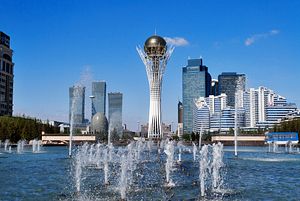Before the International Olympic Committee makes a decision on whether Kazakhstan will host the Winter Olympics in 2022, an important milestone for the Central Asian country’s image will occur in 2017. That is the year when Astana EXPO-2017 is supposed to bring millions of visitors to Kazakhstan and showcase the country to the world. A cultural, rather than a diplomatic or business event, the expo is being prepared to considerable fanfare in Kazakhstan. Even the visa regime has been relaxed (for some countries at least) in a bid to attract more visitors. New revelations by outgoing officials, however, might further tarnish the reputation of the company that organizes the event.
Astana EXPO-2017 has such a high profile in the country that a recent embezzlement case involving some of its managers was badly received by a disgruntled public. According to the most recent update on Talgat Yermegiyayev, the former chairman of the event organizer who was arrested in June, he embezzled around 4.2 billion tenge ($22.4 million). Authorities also arrested Sulambek Barkinkhoyev, former managing director, and Kazhymurat Usenov, former head of construction, accused of embezzling 214 million tenge. Kazakhstan’s President Nursultan Nazarbayev even appeared on television to speak about the incident, warning that “there are no untouchables in Kazakhstan” and that the court case against Yermegiyayev and Usenov was a “hard pill to swallow.” Nazarbayev was also taken aback by the naiveté of the officials caught embezzling public funds: “You have every state agency and watchdog looking into the expo books, how do you think you can steal?”
Shortly thereafter, Nazarbayev openly questioned the progress on the expo buildings and two senior officials resigned from the organizing company. On July 13, during a meeting in the presidential palace, Nazarbayev said he was not satisfied with the project management and that the irrationality of the allocation of lots was conducive to the theft of funds. Nazarbayev also mentioned that the expo was not being publicized enough and lacked an image-promotion strategy.
The first official to resign, Saltanat Rakhimbekova, had been appointed as managing director of the company in September 2014 and left the day after Nazarbayev’s public comments. She later stated that her decision was entirely personal and she is pursuing other career opportunities. Like Yermegiyayev and Usenov, Rakhimbekova is a member of the bureaucratic elite, close to the presidential family and Nazarbayev’s son-in-law Timur Kulibayev.
A second official left days later, leaving a trail of bitter criticism towards the organizer. Vera Kobalia, a Georgian national, resigned from her position as deputy chairman of Astana EXPO-2017 just a few months after assuming office. Kobalia had been Minister of Economy in Georgia for two years (2010-2012, during the Saakashvili era) before accepting the call from Kazakhstan. But Kobalia did not leave in silence. She was interviewed days later by Tengrinews, and used it as an opportunity to unload on the expo organizer and its management.
In the interview, Kobalia said she was in charge of the marketing and PR campaign for the event and was hired “to strengthen international ties with the participants, which would have led to more visitors.” However, “I came across very strange things. One of which is the strong nepotism at the company, which made my work harder, because in my experience it’s the team you work with that defines the chances of success for your project.” Kobalia lamented that the process of hiring and firing personnel had to be tactful, hinting that most of the workers at Astana EXPO-2017 had gained their positions through personal connections, rather than through skills and experience. “On several occasions I found myself in disagreement with the management over the hiring process,” said Kobalia, whose resignation had immediate effect. Kobalia also said she received the same pay as any other manager at Astana EXPO-2017: 1.25 million tenge ($6,700) a month.
The press service of the organizer insists that the revelations have not tainted the image of Astana EXPO-2017. The event is scheduled to open in June 2017 and it will be hard to assess its success until after its completion. What is worrisome is the level of corruption and nepotism at the state-owned company organizing the event, which could well be considered thermometer for Kazakhstan’s image-making ability and its bureaucratic wrongdoings.

































